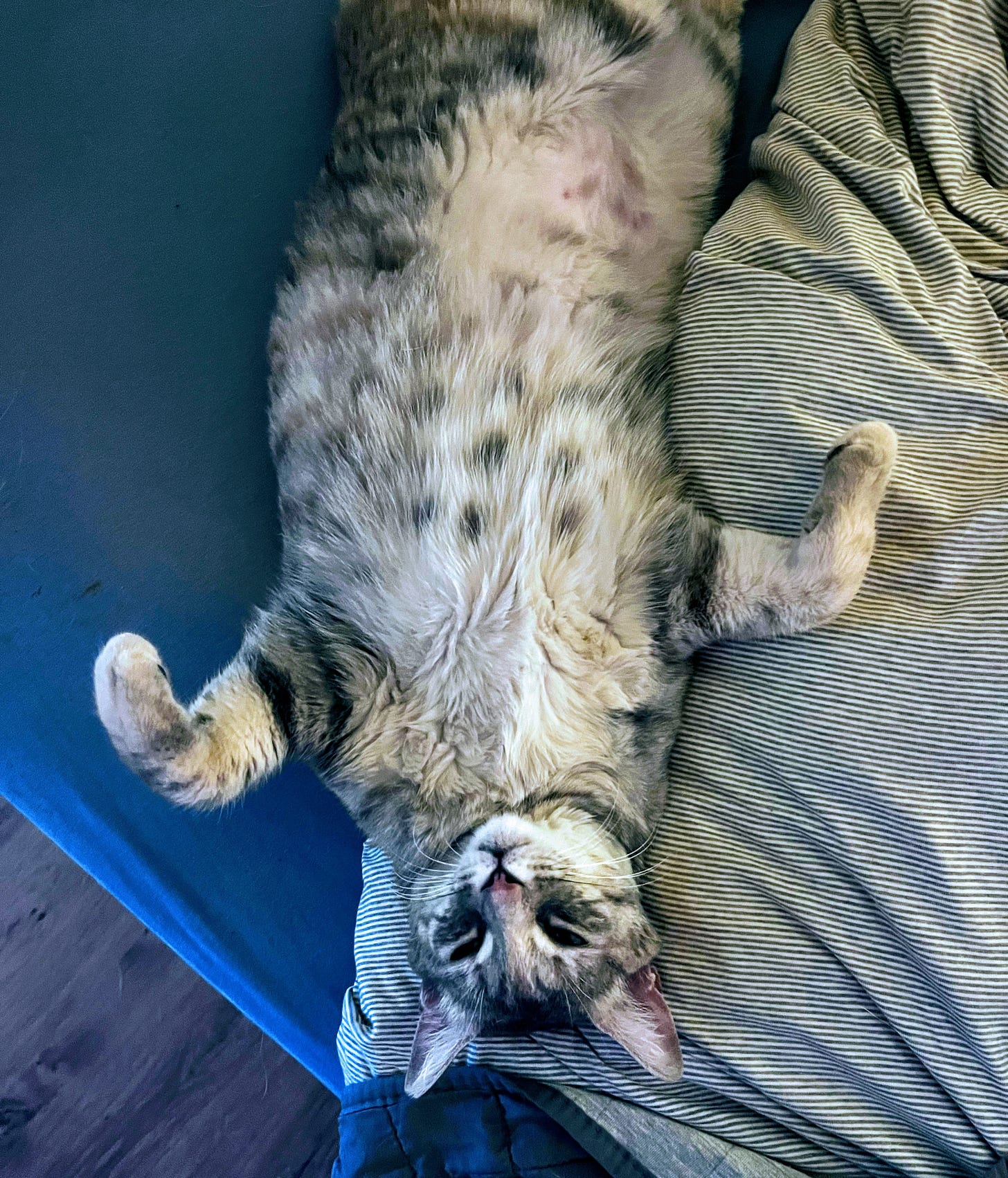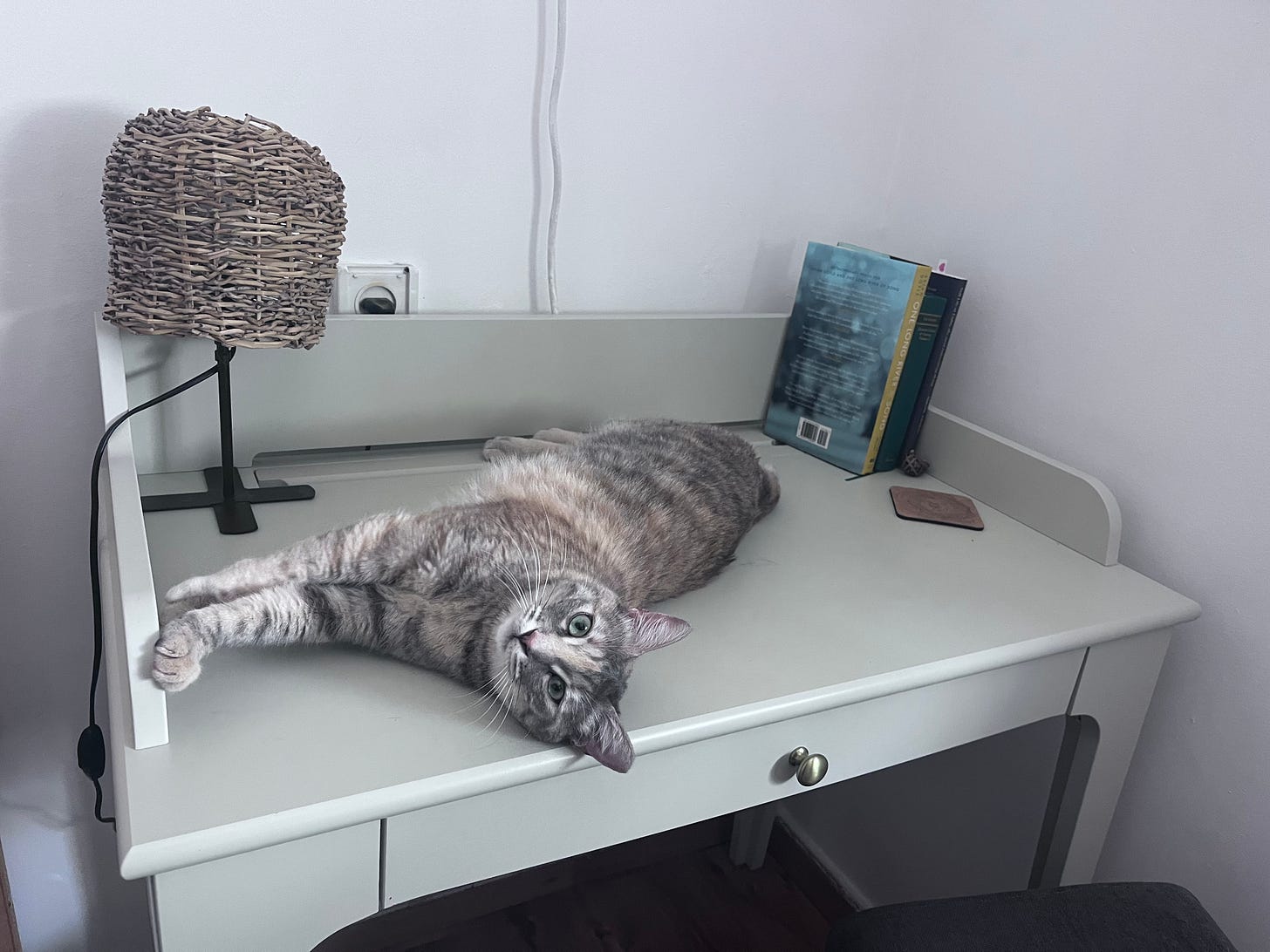What language should you speak to your cat?
every multilingual (pet) parent's burning question
Friends with Words is a newsletter about language, culture, and identity, created by a Russian-born, Israel-based essayist, linguist, former world traveler, and single mom.
If you’re disillusioned by the current state of humanity, but still secretly hope that curiosity can fix the world or at least make it a less horrible place, this space is for you. Welcome.
When we got a kitten last year, it was unanimously decided (by me) that we would speak to her in Russian.
We’re a trilingual household. At home, we speak Russian and English. Outside — Hebrew. When our labrador, Shiloh, came to live with us, she was one year old and already knew commands in Hebrew (Boi ‘Come here’, Shvi ‘Sit’, Yad ‘Paw’), so we stuck to those. But the kitten was different. It seemed fitting to speak to her in Russian because she has such a Russian-sounding name.
Officially, we named her Beatrice. When she gets medicine from the vet, it says on the envelope: “Name of patient: Beatrice.” But in reality, nobody calls her Beatrice. At home, we call her “Businka”, after the kitten that I almost got as a kid. Or “Busya,” for short.
“Businka” means “a small bead” in Russian. I love making non-Russian speakers, especially grown men, say her name. This is such a childish, girlish word — with the stress on the first syllable, a ‘soft’ ’s’, further cutened by the diminutive suffix -k (without it busina “a bead” sounds much more serious) — that it sounds ridiculously adorable coming from moustached grown male lips.
“Yeah, I know you’ve had a busy day because you’ve got Businka,” says my friend Sam from iTalki when we talk about my day in Arabic, and I am certain that he also enjoys the way this word feels in his mouth.
When we first brought her home, I told Maya, “How about we speak Russian to her?” I explained that if we say, “Businka idi syuda (“Businka, come here!”) in Russian, Shiloh will know that we’re talking to the kitten and not to her.
This was, obviously, before I knew anything about cats.
In the end, Businka comes only occasionally (regardless of the language), but Shiloh now comes consistently whenever anyone says idi syuda because she has learned that this phrase might entail treats. My dog has a severe case of FOMO.
What I really wanted
But to be honest, I also had a secret agenda. I wanted to encourage my daughter to speak more Russian at home. Until we got Businka, she understood Russian but didn’t speak it. And now, I thought, she had no choice but to start using this language if she wanted to communicate with our Russian-speaking cat.
And what do you know, with the arrival of Businka, Maya started regularly saying a few Russian phrases out loud. Three, to be precise: “Businka, idi syuda!” (“Businka, come here!”), “Ne kusat’sa” (“No biting!”) and “Businka, nelzya!” (“Businka, no!”)
Their communication never progressed any further, but I like to think that it’s thanks to Businka and these three phrases that my daughter did eventually decide to start speaking more Russian.
Just to be transparent, I have a history of bringing home a new creature to shift the language balance in my house. When my son was little, we lived abroad, and he didn’t speak any Hebrew because he had nowhere to learn it (he and I spoke Russian). So after some deliberation, I decided to give him a Hebrew-speaking sibling so that he’d have no choice but to learn Hebrew. That’s why I started speaking Hebrew to Maya from birth.
It was a glowing success. (In some ways.) Yannai didn’t become fluent in Hebrew, but he understood that this was his sister’s native tongue and that he had to make some effort to speak it if he wanted to communicate with her.
One day, when she was about 18 months old and crying in the backyard, he ran into the kitchen and asked, “Mom, how do you say ‘Mommy is coming soon’ in Hebrew?”
I remember feeling that fuzzy feeling of success: my children now needed an interpreter to interact with one another.
Gone
Businka disappeared three weeks ago. She jumped out of our first-floor window, as she did every morning, and hasn’t come back.
That evening, she didn’t accompany us halfway on our walk with Shiloh as she usually did, and she didn’t wait for us on the windowsill when we came back. The next morning, she didn’t wait with Maya for her school bus, and she didn’t jump out of the bushes to walk to the front door with me when I came home in the evening.
She is still not back, and we have no idea what happened.
We know Businka had an enemy on our street. A big-headed stripy cat who lives in the building next door. We heard them fighting a couple of times, and once he jumped on our windowsill and tried to attack Businka before we chased him away.
“I think he wants her lunch money,” Maya said, as we watched him walk away, defeated this time.
“She doesn’t have any lunch money,” I replied. “Do you think he knows that?”
“I don’t think so.”
Maybe the big-headed cat chased her away. Maybe another family adopted her. We don’t know what happened, and I worry about her, especially since the booms that we had every night for the 12 days of the war could have scared her away even further.
The Search
I sent a photo of Businka to our local dog park WhatsApp group, asking people to keep an eye out for her. Someone immediately asked what name she responds to. Yannai (who is also in that group) implored me: “Don’t answer her! Reply to her personally!” But I had to answer her because it would help everyone to look for her.
I waited till my teenager safely left the group to spare him the embarrassment of watching his mom spell a brazenly Russian word out loud. To be honest, I felt a little self-conscious, too. Especially since, without close supervision, people tend to mispronounce her name.
When, after a couple of days, she still wasn’t back, I posted about her on the city’s Facebook group and hung posters around the neighborhood.
It felt like coming out, step by step, as “a person who gives her cats very Russian names.”
Now I get regular phone calls from people who ask, “Are you Businka’s mom?” and I’m always pleasantly surprised that they manage not to butcher her name. They say they saw a cat that looked just like her.
It’s always the same cat. She lives uphill about 50 meters away from our house, and to an untrained eye, looks like Businka, but she is not Businka. I dutifully go and look at her every time just to confirm that it’s not her.
At least that cat is getting a lot of attention now.
Things I’ve learned from Businka
I didn’t know that cats are so great. That they are so fluffy and warm and clever and loyal without being overimposing. I thought they were aloof and mean and couldn’t care less about you.
But it turns out they’re nothing but good vibes. They form such deep bonds with you — I know because she insisted on sitting on my keyboard when I tried to work, or cuddling under my belly when I got into child’s pose during my evening yoga, or crawling right under my arm in the morning to be petted — and yet they’re their own being.
A dog is like a devoted boyfriend, or your overprotective mom — somebody who is there for you, ready to dissolve into you, do anything for you, but also totally dependent on you. But a cat is like your closest friend who has come to spend time with you. You share this deep connection, but she’s her own person.
I didn’t know cats could talk. When Businka was playing outside, I sometimes called her out the window, saying “Businka idi syuda!” And she always appeared very quickly from wherever she was hiding and said “Mioew!” That means “What?” And it’s an enthusiastic “What?” that translates from Cat as “I like you and am excited that you called me, but you better have something exciting for me.”
And when I’d catch her doing something she wasn’t supposed to do — ravaging a roll of toilet paper, drinking leftover chicken soup, or biting my toes at 5 am, I would say Busya nelzya! and she would stop, but only so she could look up at me and say “Meow?” That meow means “What?” but it’s a teenager’s insolent “What??”, as in “What did I do??”
I didn’t know cats talked back.
If Businka comes back, we’ll get another cat. If she doesn’t, we’ll get another cat or two.
“But then we’ll have to go through the same thing!” Maya says.
I guess we might. But it’s worth it in the end.
It’s worth it because animals make you so much more… human.
Friends with Words takes many hours a week to create. If you enjoy my writing, consider making a one-time or monthly donation ☕
If you’re a writer on Substack, consider recommending Friends with Words to your readers (Go to Dashboard>Recommendations>Manage>Add recommendation)






I hope she's spayed. If not, she might return pregnant. In either case, I truly home you find her. I love my cats so much, and agree with your interpretations of their personalities and language. All best to you and your dear family.
Very sad :( I live with 4 cats, when we lived in a flat I just didn't let them out, I was afraid something bad could happen. Now they have a part of our garden fenced so that they go out but only there. I hope your cat comes back! <3